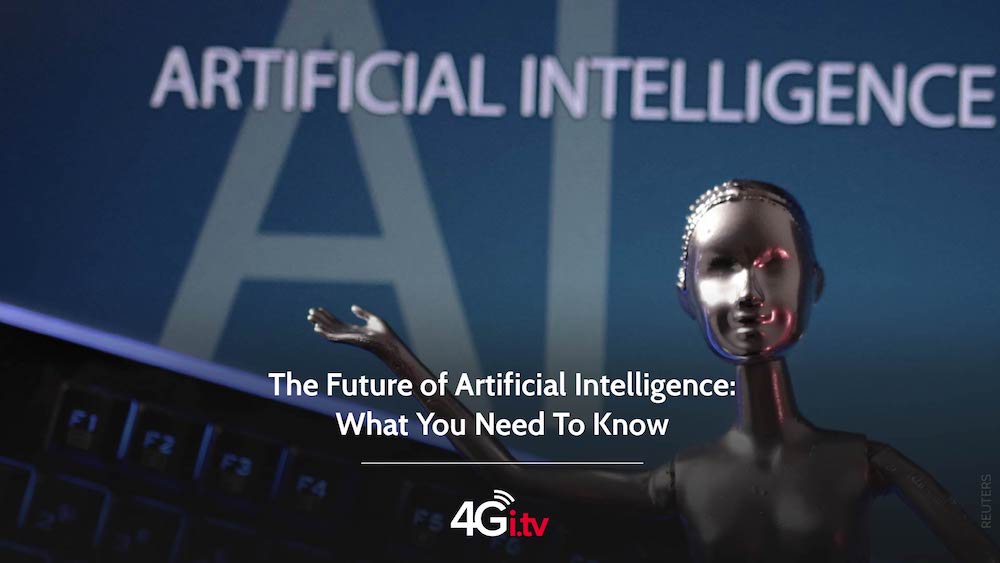The Future of Artificial Intelligence: What You Need to Know

Do you want to know about the future of artificial intelligence and what it holds for us? In this article we go in depth. Discover everything that is to come with 4G.
Artificial intelligence (AI) has become one of the most revolutionary technologies of our time, transforming the way we live, work and interact with the world. In this article, we’ll dive into the future of artificial intelligence and what you need to know about this exciting, ever-evolving field. From automating routine tasks to developing more accurate medical diagnostic systems, AI promises to redefine virtually every aspect of our lives.
Definition and Basic Concepts
Before we dive into the future of AI, it’s important to understand its basics. Artificial intelligence refers to the ability of machines to imitate human intelligence and perform tasks that would normally require human thinking. This includes machine learning, natural language processing, computer vision, and more. AI relies on sophisticated algorithms and large data sets to make intelligent decisions. Understanding these fundamentals will help you appreciate the endless possibilities that AI can offer in the future.
Brief History of Artificial Intelligence
The history of artificial intelligence (AI) is a fascinating tale that dates back to the mid-20th century. As we explore this brief history, we can see how AI has evolved from its first theoretical concepts to become a reality that is transforming the world we know.
- 1940s and 1950s: The beginnings of AI can be traced to the efforts of pioneers such as Alan Turing, who developed the Turing Machine, a hypothetical machine that laid the foundation for computing and artificial intelligence. During this period, research was conducted into the possibility that machines could imitate human thinking.
- 1950s: The term “artificial intelligence” was coined by John McCarthy, who also organized the famous Dartmouth Conference in 1956, which marked the official beginning of AI as a field of study. Initial experiments were carried out, such as Allen Newell and Herbert A. Simon’s Logic Theorist program, which demonstrated that machines could perform intellectual tasks.
- 1960s: The first natural language systems were developed, such as ELIZA, a natural language processing program created by Joseph Weizenbaum. During this decade, AI focused on problem solving and reasoning, leading to the development of the Dendral program for chemical analysis.
- 1970s: A focus on knowledge representation and fuzzy logic occurred. Systems like MYCIN were used for medical diagnosis, marking a milestone in the application of AI in medicine.
- 1980s: AI experienced a boom and subsequent bust, known as the “AI winter.” Despite the lack of significant advances, research continued in areas such as computer vision and natural language processing.
- 1990s: AI experienced a resurgence thanks to advances in machine learning and artificial neural networks. These approaches allowed machines to learn from data and improve their performance over time.
- 21st century: Artificial intelligence has experienced a new era of spectacular advances. The advent of large data sets, deep learning algorithms, and increases in processing power have boosted AI applications in areas such as computer vision, natural language processing, robotics, and much more. Virtual assistants like Siri and Alexa, as well as AI systems in autonomous vehicles, are examples of how AI is integrated into our daily lives.
Current Applications in Industry and Everyday Life
Artificial intelligence has transcended its experimental phase to become an integral part of our daily lives and industry. As we explore the current applications of AI, it is evident how this technology has revolutionized our society and our work environments. Some of the applications given to AI are:
Virtual Assistants
Virtual assistants like Siri, Alexa and Google Assistant have become digital companions in many homes. These systems use natural language processing and machine learning to answer questions, perform tasks like setting reminders and playing music, and control smart devices in the home.
Speech Recognition
AI has revolutionized speech recognition, enabling applications such as automatic speech-to-text transcription, voice assistants in cars, and voice dictation systems. This technology facilitates communication and accessibility.
Computer Vision
AI has dramatically improved the ability of machines to understand and process images and videos. This is used in security applications, such as detecting objects and people in surveillance cameras, as well as medical applications, such as diagnostic imaging and disease identification.
Automation and Robotics
In industry, AI is used in robots and automation systems for tasks such as assembly, logistics and quality control. Collaborative robots work alongside humans in production environments, increasing efficiency and precision.
Medicine and Diagnosis
AI systems are used in the interpretation of medical images, such as X-rays and MRIs, to aid in the diagnosis of diseases. In addition, AI is used in drug research, the discovery of new compounds and the personalization of medical treatments.
Finance and Data Analysis
In the financial sector, AI is used for risk analysis, fraud detection and investment decision making. The ability to process large volumes of data in real time is essential for making smart financial decisions.
E-Commerce and Advertising
AI-powered recommendation engines, such as those from Amazon and Netflix, help users find products and content that may interest them. Additionally, AI is used in online advertising to optimize ad targeting and personalization.
Customer Service
Chatbots and AI-based customer service systems are used to provide quick responses and resolve issues online. This improves efficiency and reduces the workload on support teams.
Autonomous Transportation
AI is transforming transportation through autonomous vehicles. Companies like Tesla, Waymo and Uber are developing vehicles that can drive autonomously, promising to revolutionize the transportation industry.
Education
AI is used in educational applications to personalize learning, provide instant feedback to students, and assist educators in curriculum assessment and planning.
Ethical and Social Impact of Artificial Intelligence
The growing presence of AI in our lives raises important ethical and social questions. It is crucial to address these concerns as we move toward the future of AI.
Ethical Debates Around AI
Job automation, data privacy, algorithmic discrimination, and ethical decision making are hot topics in the world of AI. Society must consider how to balance technological progress with the protection of human rights and values. Ethical debates around AI challenge us to find solutions that allow us to harness its benefits without compromising our fundamental principles.
AI and Employment: Challenges and Opportunities
While AI has the potential to increase productivity and create jobs in new areas, it also poses challenges for workers in automatable roles. Training and adaptability will be key to taking advantage of the opportunities that AI offers. As machines take on repetitive tasks, humans can focus on jobs that require creativity and emotional skills, giving us the opportunity to reinvent the way we work and live. AI is not only a challenge, but also an opportunity for personal and professional development.
Innovations and Future Trends
The future of artificial intelligence is full of exciting innovations and trends that are shaping the technological landscape. Two key areas that deserve special attention are:
Artificial Intelligence and Big Data
AI and Big Data are increasingly interconnected. The ability to analyze large volumes of data in real time is essential for making intelligent decisions. AI can extract valuable insights from massive data sets, revolutionizing industries such as healthcare, commerce and research. The combination of these two technologies will open new perspectives for data-driven decision making.
The Convergence of AI and other Technologies (IoT, Blockchain, etc.)
AI does not operate in a vacuum. It integrates with other disruptive technologies such as the Internet of Things (IoT) and blockchain. This convergence promises more efficient and secure solutions in a wide range of applications. From supply chain management to cybersecurity, combining AI with these technologies will drive digital transformation across industries.
Current Challenges and Limitations of AI
Despite its potential, artificial intelligence faces challenges and limitations that must be addressed to ensure its long-term success.
Technological and Cognitive Limitations
AI still has limitations in terms of understanding context, reasoning, and ethical decision-making. As we move into the future, improving AI’s ability to understand and respond to complex situations is essential to its evolution. We must also address the gap between AI and human intelligence, which raises fundamental questions about consciousness and ethics.
Security and Privacy Issues
The growing reliance on AI raises significant concerns about data security and privacy. The protection of personal information and the security of AI systems are critical issues. Ensuring transparency and ethics in data collection and use is a challenge that must be addressed effectively to maintain trust in technology.
In short, the future of artificial intelligence is marked by exciting innovations and significant challenges. The integration of AI with Big Data and other technologies is shaping a constantly evolving world. As we overcome technological limitations and address security and privacy issues, we can fully harness the transformative potential of AI in our society.
Artificial Intelligence in the Future
Artificial intelligence promises to play an even more central role in our lives in the future. We will explore some predictions and future scenarios to understand how AI will continue to transform our world.
Predictions and Future Scenarios
Experts in the field of artificial intelligence have made various predictions about its impact in the future. These range from advances in medicine, where AI could personalize medical treatments, to autonomous driving, which could make roads safer. Additionally, AI could revolutionize education, manufacturing, and political decision-making. Understanding these predictions gives us a glimpse into a world that is constantly evolving, driven by AI.
Preparing for a World with Advanced AI
As AI advances and becomes an integral part of our society, it is essential that we prepare for a world with advanced AI. This involves developing skills necessary to work alongside AI, establishing appropriate regulations for its ethical use, and fostering collaboration between industry, academia, and government. Preparing for this future allows us to take full advantage of the benefits of AI while mitigating potential risks.
Conclusions
After exploring the present and future of artificial intelligence, it is important to summarize what we have learned and highlight the importance of staying informed about this constantly evolving technology.
Summary
We have taken a journey through the definition and basic concepts of AI, its history, current applications, ethical and social impact, future innovations and trends, as well as the challenges and limitations it faces. Along the way, we’ve discovered how AI is redefining our lives and our industries, while raising significant ethical dilemmas and technological challenges.
It is key to remember that artificial intelligence is a transformative force that will continue to shape our world in the future. Preparing for this future, understanding its predictions and future scenarios, and staying informed are key steps to maximizing its benefits and addressing its challenges. AI is a powerful tool, and it is society’s responsibility to use it wisely and ethically.
The Importance of Staying Informed about AI
As AI continues to advance, it is essential that both individuals and organizations stay informed and up-to-date on its developments. Technology is advancing rapidly, and understanding AI and its implications becomes a competitive advantage in the world of work. Furthermore, public awareness about AI and its impact on society is essential to making informed decisions and engaging in meaningful debates about its regulation and ethical use. Staying informed is an ongoing commitment that allows us to fully realize the potential of artificial intelligence while addressing its challenges responsibly.
POPULAR POSTS

Earthquakes and emissions undermine the idea of carbon storage in Texas
December 17, 2024


Rescuers search for cyclone survivors in devastated Mayotte
December 17, 2024

“Gilmore Girls” airs for a second season on Hulu
December 17, 2024
LIVE STREAM



